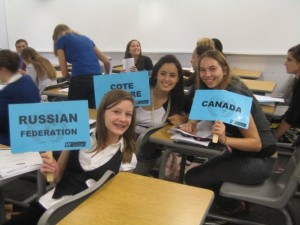I had written in my How to Build a Top Travel Team – Overview post about how selecting the right conferences to attend can influence your team’s ability to win awards at that conference and grow competitively as a team. The top travel teams have a strategy and a process in place when selecting conferences to attend to ensure that both happen. Here I will share with you the five basic steps and then three more advanced strategies:
1. Select the appropriate circuit. It’s a given to send your team to the appropriate circuit: college, high school, or middle school.
2. Consider local conferences first. You can use the Best Delegate Conference Maps to find your local conferences. These are your bread-and-butter conferences because they are the ones that most of your delegates can financially afford to attend consistently every year. While they may not be the most glamorous conferences, they are the easiest to field the largest and most competitive teams and are important in building up your talent pipeline. Also, it’s important to build a local network and to brand your school in a circuit, particularly if your organization plans on or already hosts a conference. After you have selected some local conferences, then throw in a prestigious travel conference (or a few) if your members are interested, ambitious, and can afford it or fundraise for it.
3. Match conferences with team goals. Every conference should help your team achieve a developmental goal, whether that be an educational mock session for first-timers to learn, a beginner conference to novices to build confidence, a regular conference for everyone to build skills and have an opportunity to win awards, a competitive or prestigious conference to challenge the best team members, or a niche conference for members to try something new and creative. Some conferences are designated as novice conferences, but most conferences are not and using the size of the conference can be an acceptable indicator of its competition level. Remember that selecting the right competition level is essential to growing your team’s competitive strength.
4. Review the dates. Dates have a major impact on which delegates can attend. You want to ensure that there are no major campus event conflicts with your team members, that the conferences you plan to attend are spread apart enough to allow adequate time for researching and writing any position papers (3-4 weeks are recommended), that your team has enough time to train delegates, that delegates have enough time to fundraise or come up with the money to attend, and if applicable, that it doesn’t complicate your program’s efforts to host your own conference.
5. Review the costs. Take note of the delegate fees and travel expenses. You want to make sure that your team’s members can afford to attend the conference or that you have developed a fundraising or subsidization strategy to address the financial needs. This is important to ensure that your talented members are not priced out from good opportunities.
Besides the five basic steps, there are also three advanced strategies that top travel teams consider when selecting conferences to attend:
Philosophy of Judging: Different schools are taught different styles to participate in Model UN; some schools are more competitive while others are more diplomatic (see Favoritism & Philosophy). The takeaway is that students who are chairing committees will favor the style they are taught and will tend to award delegates that mirror that style, and that it may be advantageous to counter this subconscious bias by adapting your style to that conference or selecting conferences hosted by schools of similar teaching. One of the keys to winning Best Delegate is to have your students research the conference in advance.
Build familiarity with team brands: Top travel teams will attend a certain set of conferences consistently every year because they understand it is advantageous to build familiarity with the conference and circuit in order to understand each others’ brands and reputations. Building familiarity helps you understand a school’s judging style and how to effectively work with delegates from different schools, including those that you may work with again in future committees. Stronger relations with other schools also lead to advisors sharing best practices as well as better rivalries. At the college level, you also want to select conferences that are conducive to networking with students of similar caliber as they will probably end up in similar career fields as you.
Business development: If your program hosts a Model UN conference, then you need to consider going to other conferences for business development (i.e. recruit attendance to your own conference). You might attend a conference hosted by a large school so that they can reciprocate their attendance, or you might go to a local conference to encourage the advisors and head delegates to participate at your conference as well. Since college teams travel more due to the limited supply of local conferences, a team might travel to another conference to tap into a new market.
***
The five steps above are the basics in selecting a conference to attend, and the three advanced strategies help you optimize your winning potential as well as your schedule to your program’s overall goals. You should be able to create a lineup of conferences for the year based off those tips. For many reasons mentioned above, an ideal conference lineup would include at least one novice conference, several conferences that match your team’s competition level, at least one prestigious/challenging conference, and optionally a travel conference or a niche conference for fun.
Which conferences does your school attend and why? Let us know in the comments!



